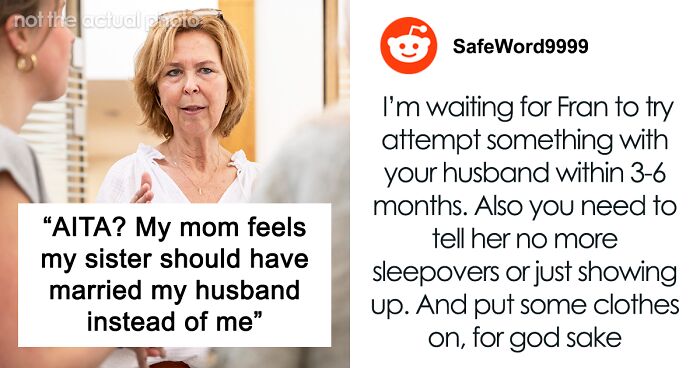
Woman Gets Upset Over Mom’s “Harmless Joke” About Her Marriage, Husband Doesn’t Take Her Side
Interview With ExpertWhen people commit to a relationship, they have to be prepared to not only resourcefully manage the issues that might arise inside of it but also be ready to address any external factors that may intrude on it. These imposing outsiders often happen to be family members who can’t seem to keep their controversial opinions to themselves and can be notoriously difficult to deal with.
This Reddit user’s marriage was shaken up by her mom, who told her that her sister should have married her husband instead of her. Her sibling also didn’t help the case, as she would frequently hang out with him alone and always bring up the fact that she was his former crush. Having received quite a few disrespectful comments about her relationship, she became very upset and turned online for perspective.
Scroll down to find the full story and a conversation with relationship coach Brigitte Theriault and relationship specialist and author of The Infidelity Cure, How to Rebuild Your Relationship & Your Life After Your Affair, Jeanne Michele, PhD, who kindly agreed to tell us more about parents intruding on their children’s relationships.
Rarely do people enjoy hearing disrespectful comments about their relationship
Image credits: Image-Source / envato (not the actual photo)
This woman was no exception, especially because they came from her own mother
Image credits: Oleksandr P / pexels (not the actual photo)
Image credits: ta-momsister343242
If a couple allows chronic intrusiveness, it can greatly disturb or threaten their relationship
Image credits: Vera Arsic / pexels (not the actual photo)
Filtering family’s opinions on romantic relationships can be difficult because we want to belong, says relationship coach Brigitte Theriault. “Even as adults, we continue to crave our parents’ approval and love, fearing rejection and disappointment. These feelings often stem from deeply ingrained childhood patterns that are hard to break. Our parents shape our self-concept from a young age, making their opinions feel weighty and difficult to dismiss.”
On the other hand, parents might feel that they have a say in their child’s life because they want to protect them from potential mistakes and believe they know what is best for them. “When children enter relationships or get married, parents naturally want the best for them. Often, parents offer advice out of a desire to protect their children from the pitfalls and challenges they have experienced. In some cases, they believe they know better due to their life experience and want to continue contributing to their children’s well-being,” says relationship specialist Jeanne Michele, PhD.
Even though they might come from a good place, they’re trying to direct an adult that now has their own agency, says Theriault. “Sometimes parents project their own past experiences, regrets, or fears onto their children, leading to unsolicited advice. The challenge is evolving the parent-child dynamic to recognize the child’s autonomy.”
If a couple allows chronic intrusiveness to get to them, it can greatly disturb or threaten their relationship. Even though close-knit families are a rare gift, excessive parental involvement can create significant tension and difficulties.
“Depending on the level of intrusion, a parent can wedge themselves between the child and their partner. This can look like making harsh comments about the partner, criticizing them, or withdrawing affection from their own child. It leaves the child stuck, torn between loving their partner and maintaining peace with their parents, unsure of how to balance it all. This ongoing tension can take a toll,” says Theriault.
“Parental interference can impact the couple’s decision-making and sense of independence. Over time, it can erode trust and intimacy within the relationship, as the couple is constantly navigating external pressures instead of focusing on their own bond. It may even foster resentment towards the parents, which further complicates the dynamics.”
Dealing with intrusive family members requires understanding and compassion
Image credits: Sergey Makashin / pexels (not the actual photo)
Therefore, “parents and adult children must find new ways to reshape their relationship as romantic partners enter the picture,” says Michele. “It’s a delicate balance between pulling away and creating new boundaries while still maintaining a healthy, respectful connection. Respect is at the core of any relationship, and the shift from reliance on parents to building an independent life with a partner is a natural part of growth for both parents and children.”
Deciding to establish boundaries might mean that the child won’t speak to their parent or limit contact until they change their attitude, says Theriault. “It could involve a difficult conversation to make it clear that the partner is here to stay and cooperation is needed,” she notes. “Boundaries aren’t a one-time fix; they require consistency and may need to be revisited. Couples should communicate openly with each other to present a united front when dealing with parental interference. In more severe cases, family therapy or counseling might help address deeper issues and improve communication across all parties.”
“Open communication is key to navigating this transition,” highlights Michele. “It’s important for both parents and their adult children to respectfully address differences and ask before offering advice. By approaching these conversations with kindness and understanding, both parties can foster healthier dynamics and relationships as they move into this new phase of life.”
In the meantime, the couple should continue to build trust in themselves and their relationship. Partners who have strong trust in each other are less likely to let advice from family hinder their connection. They know that they are secure enough to handle whatever comment they’re thrown their way.
It might be impossible to tune out 100% of others’ opinions and if we don’t care about them at all, we may push away the people we value the most. So it’s okay to value the beliefs of others, just not to a point where it becomes more important than our own.
The author provided more information in the comments
The majority of readers supported the author
While a few thought she was at fault
Poll Question
Thanks! Check out the results:
NTA but the others are. Sister is still treating her like she doesn't count, mother is too and husband is the biggest A hole because he brushed her feelings aside. I wonder if hubby likes having both the sisters around??? I do think OP is still caught in the nerdy 5th wheel mentality but therapy should fix that.
Update! https://www.reddit.com/r/AITAH/comments/1g9o0pr/update_aitah_my_mom_feels_my_sister_should_have/
Load More Replies...Mom's explanation made it even more inappropriate. If she'd said, I just meant I wish you'd married a good man and avoided a lot of hurt, you could pretend that she didn't mean at the expense of her other daughter. But she went right to money in what sounds like something she and sister had talked about before. It removed any doubt of weirdness. It really does sound like there's latent feelings that the little sister "stole" the partner mom had dreamt for her elder daughter. For James's part, he probably just doesn't want to think about it and wants to move on, but sounds like Mom and Sister have deeper issues.
Or, it's also possible that James and sister are already having an affair, and mom knows about it, or mom is suspicious of one. And mom is trying to put the idea into OP's head in a way that justifies it. Like, you can't hate your sister for stealing your husband, because she needs a good a husband, and you don't. In my opinion, nobody should "need" a spouse to make their path in life, or you can end up in a very crappy situation.
Load More Replies...She should openly ask (with her husband and possibly mother present) what her plans for the future are. She is struggling financially, but doesn't seem to be trying to find a better job, and she won't find a supporting new husband either while she's lounging around with them. Supporting someone in times of struggle is good, but this situation cannot be maintained indefinitely. And then confront the husband with the fact that he might be doing the opposite of helping her by trapping her in wistful nostalgia.
NTA but the others are. Sister is still treating her like she doesn't count, mother is too and husband is the biggest A hole because he brushed her feelings aside. I wonder if hubby likes having both the sisters around??? I do think OP is still caught in the nerdy 5th wheel mentality but therapy should fix that.
Update! https://www.reddit.com/r/AITAH/comments/1g9o0pr/update_aitah_my_mom_feels_my_sister_should_have/
Load More Replies...Mom's explanation made it even more inappropriate. If she'd said, I just meant I wish you'd married a good man and avoided a lot of hurt, you could pretend that she didn't mean at the expense of her other daughter. But she went right to money in what sounds like something she and sister had talked about before. It removed any doubt of weirdness. It really does sound like there's latent feelings that the little sister "stole" the partner mom had dreamt for her elder daughter. For James's part, he probably just doesn't want to think about it and wants to move on, but sounds like Mom and Sister have deeper issues.
Or, it's also possible that James and sister are already having an affair, and mom knows about it, or mom is suspicious of one. And mom is trying to put the idea into OP's head in a way that justifies it. Like, you can't hate your sister for stealing your husband, because she needs a good a husband, and you don't. In my opinion, nobody should "need" a spouse to make their path in life, or you can end up in a very crappy situation.
Load More Replies...She should openly ask (with her husband and possibly mother present) what her plans for the future are. She is struggling financially, but doesn't seem to be trying to find a better job, and she won't find a supporting new husband either while she's lounging around with them. Supporting someone in times of struggle is good, but this situation cannot be maintained indefinitely. And then confront the husband with the fact that he might be doing the opposite of helping her by trapping her in wistful nostalgia.

 Dark Mode
Dark Mode 

 No fees, cancel anytime
No fees, cancel anytime 



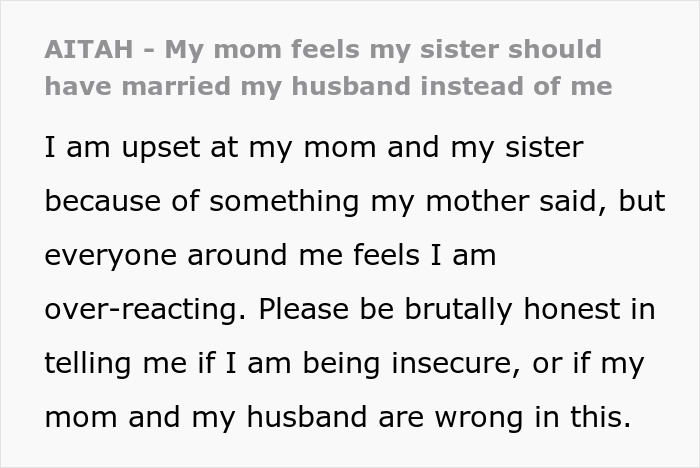

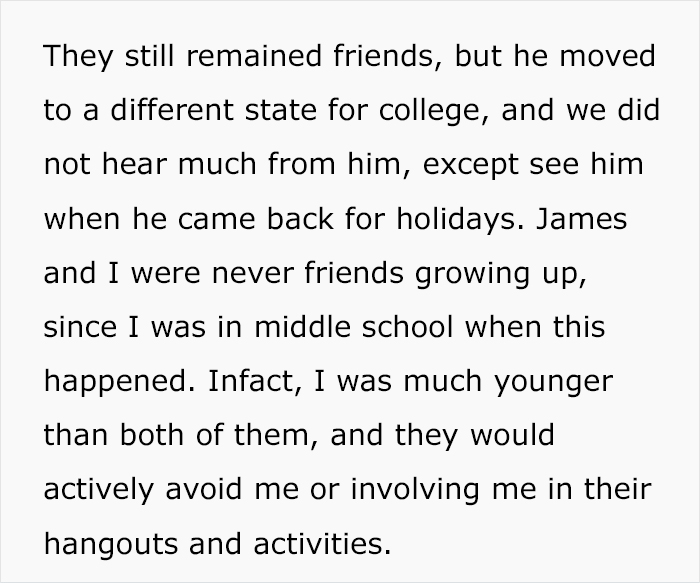












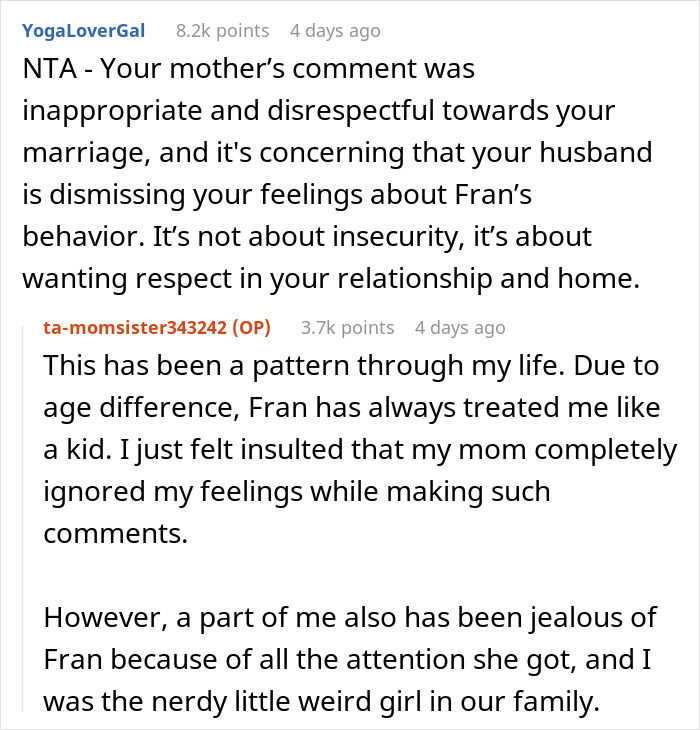

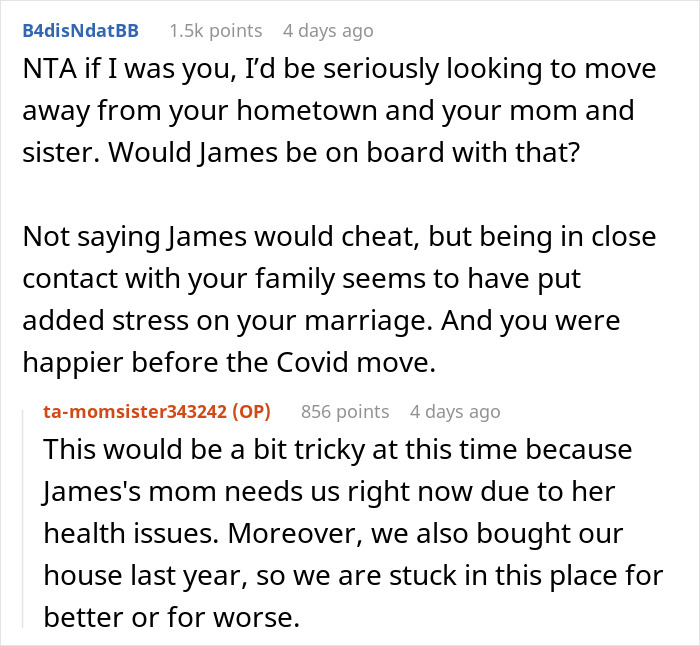
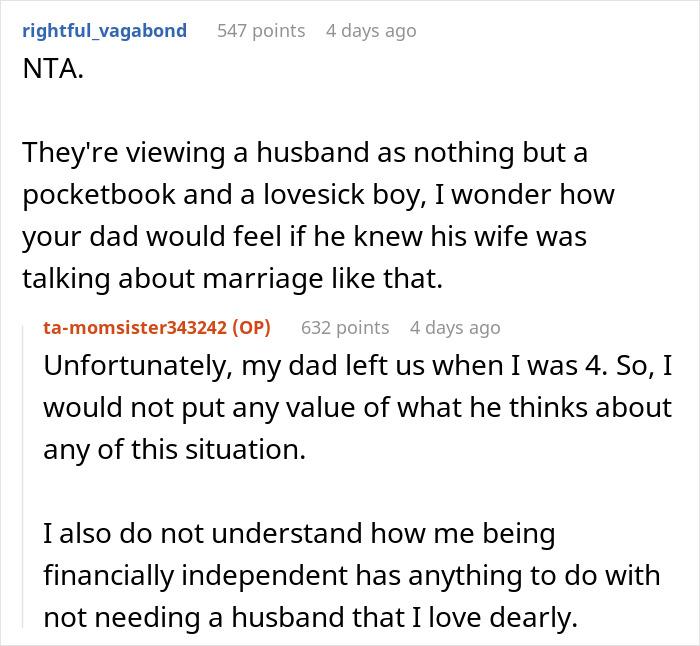
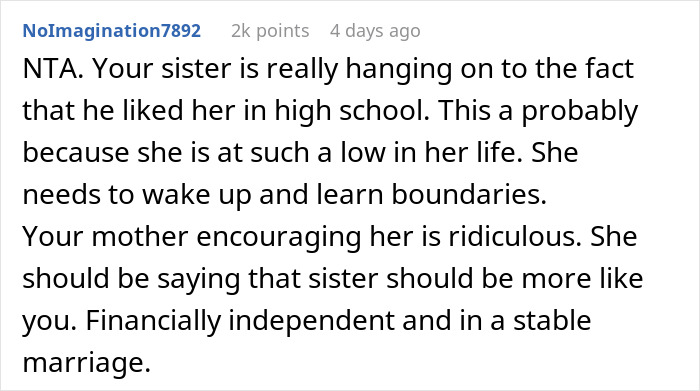
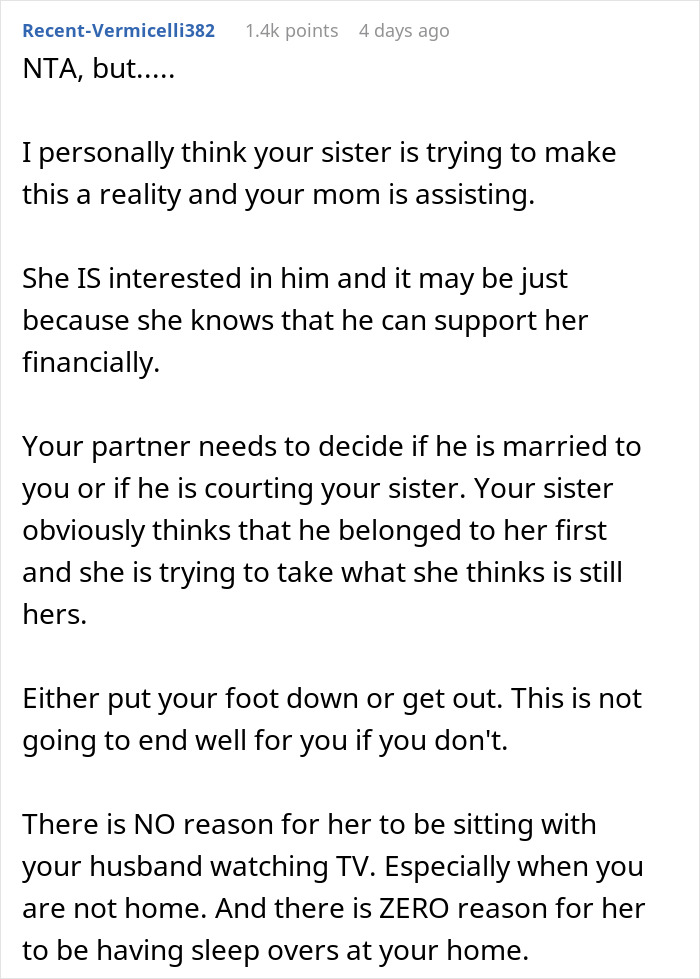






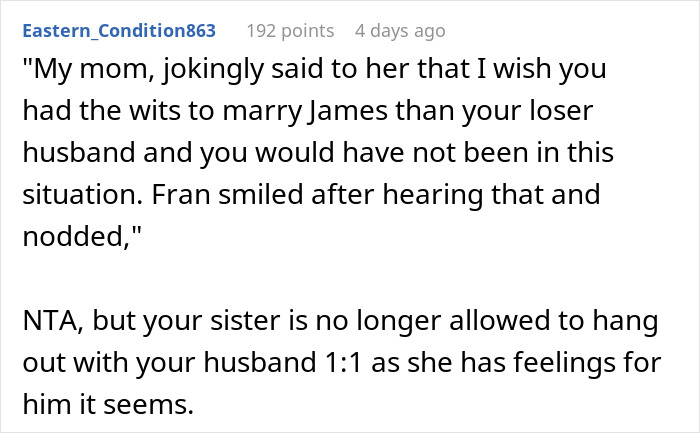
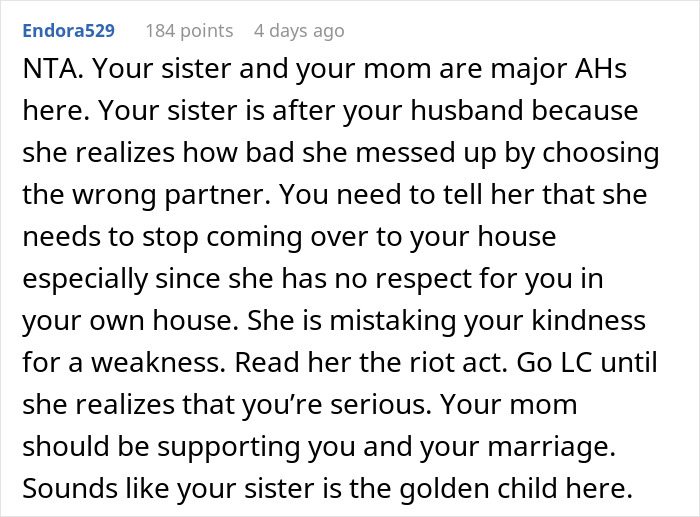
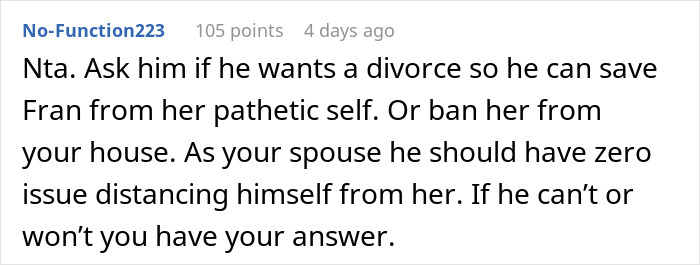
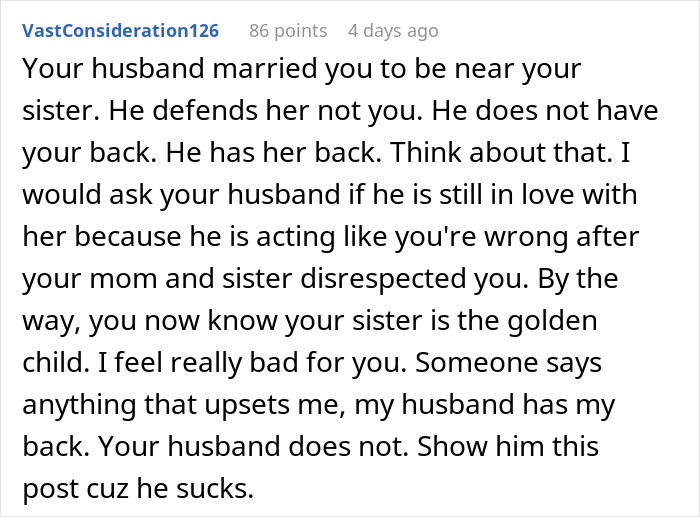


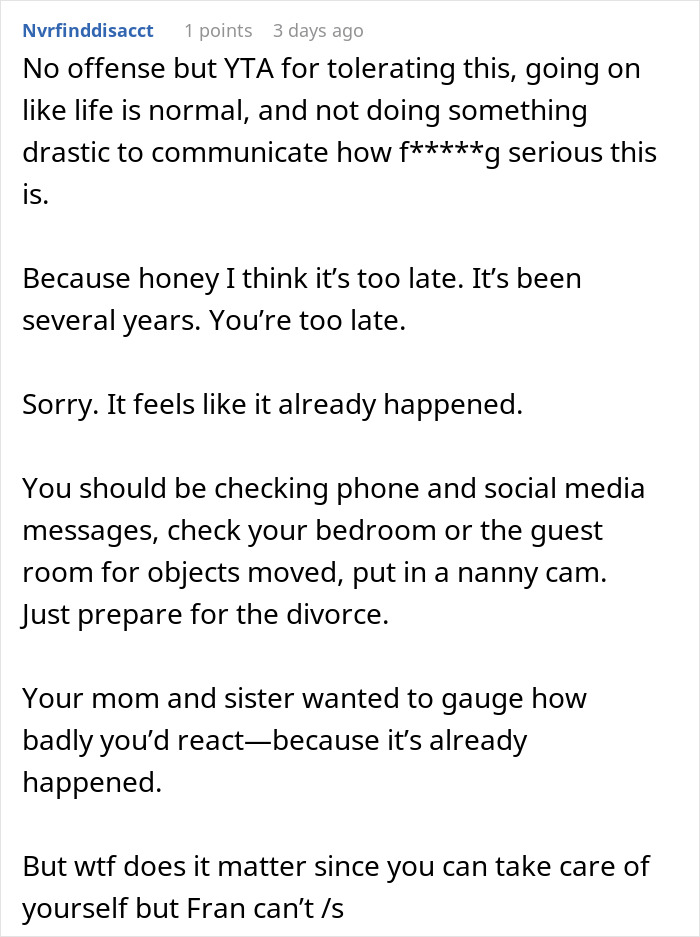
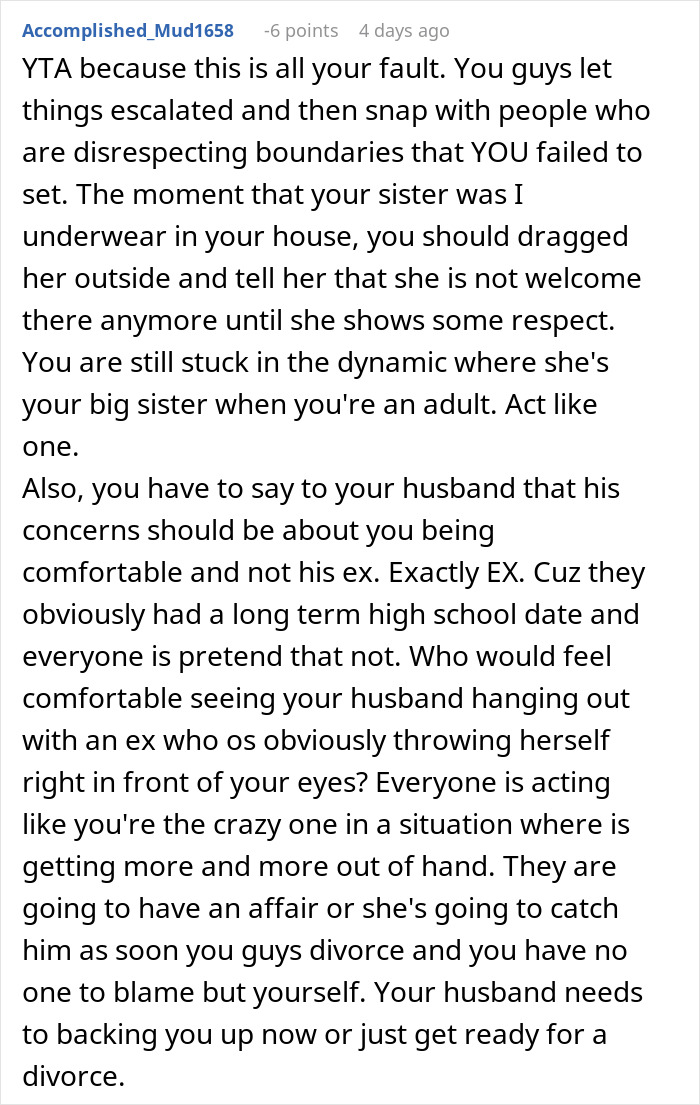












































36
46